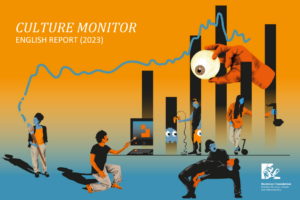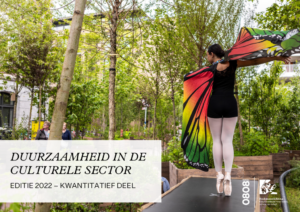The cultural sector can play an important role in combating the climate crisis. Firstly, the sector can still do a lot to reduce its own climate impact. Indeed, it is becoming increasingly urgent to do so, due to the climate crisis itself, the energy crisis, coming regulations and the changing expectations of the public and society. In addition, culture can help to visualise the climate crisis, its causes and possible solutions and in doing so contribute to awareness and new ideas.
The two-part publication Sustainability in the Cultural Sector – 2022 Edition examines to what extent, and in what ways, the Dutch cultural sector is working on this. The publication’s goal is to inspire cultural organisations and to offer policymakers insight into the bottlenecks and needs that stand in the way of making the sector more sustainable. This first part reports on a survey that was completed by 216 cultural organisations (114 of these in full)[1] between 16 May and 19 June 2022. Although the results cannot be assumed to be representative, they nevertheless form a valuable sample that does justice to the great diversity of organisations in the cultural sector – in terms of the type and size of the organisation and their accommodation situation.
The results show that sustainability is considered highly important (8.8 on a scale of 1 to 10), but that respondents have a moderate estimate of the extent to which they actively work on sustainability (6.2 on a scale of 0 to 10), with 80.7 per cent of them indicating that they want to intensify these efforts in the future. Currently, the three most common activities are separating waste (three or more types), giving attention to the climate crisis in programming, and encouraging employees to travel by public transport. These results are very similar to a previous survey conducted in 2019.
The same applies to the extent to which sustainability is a structural part of respondents’ business operations. This does not seem to be the case for most respondents. For example, 63.9 per cent of the respondents do not have a plan for improving in sustainability, 57.4 per cent of the respondents are not responsible for sustainability, and 83.3 per cent of the respondents do not track any figures relating to sustainability.
The main bottlenecks experienced are a lack of money, dependence on other parties and the higher priority given to other issues. It is also striking that more than half of the respondents indicate that a lack of support from (cultural) policy-making has a moderate to great influence on attempts to make an organisation more sustainable. However, further research is necessary to gain insight into how this inadequacy is generally experienced.
In addition to making their own organisations more sustainable, many cultural organisations pay attention to the climate crisis in their production or programming. In the past five years, 59 per cent of respondents have done this, and 53 per cent of respondents are certain they will do so in the next two years. Public reactions to this are mainly positive, although the question remains as to what extent such works have an impact on visitors.
The publication concludes with ten striking findings based on the research conducted:
- The extent to which, and the way in which, the sector is becoming more sustainable in 2022 greatly resembles the situation in 2019
- While cultural organisations are working on sustainability, they are very far from using all the possibilities
- The energy crisis can accelerate the transition to sustainability
- Cultural organisations experience a lack of (cultural) policy support
- Financing and guidance are the most important needs
- Subsidy providers can help to stimulate sustainability
- Sustainability offers many benefits
- The climate crisis plays a significant content-generating role in the work of cultural organisations
- There is still insufficient insight into the climate impact of the culture sector itself
- We know little about public expectations of the sector.
[1] The second part will be published in December 2022 or January 2023 and offers an overview of sustainable initiatives, developments and partnerships in the sector based on desk research and interviews.



